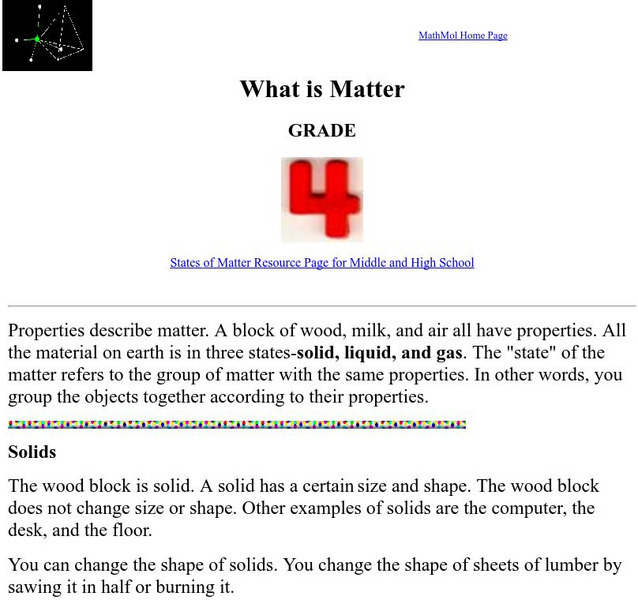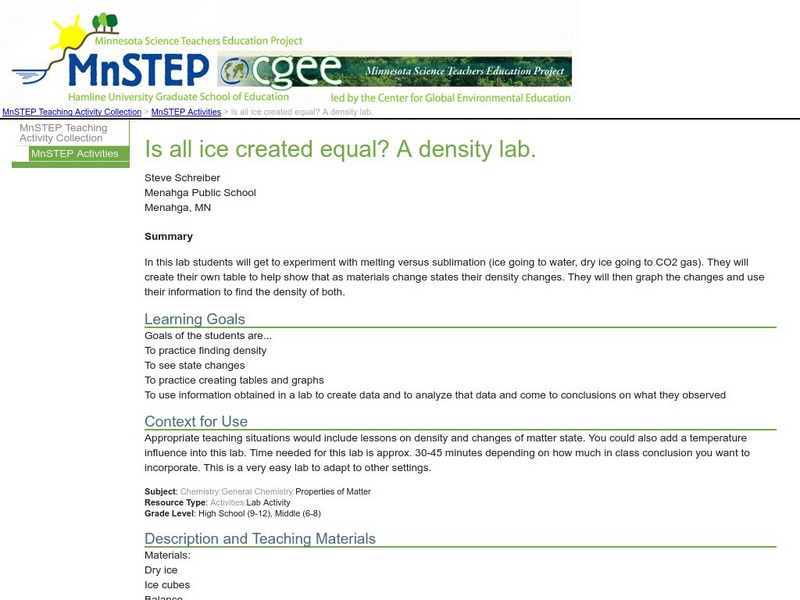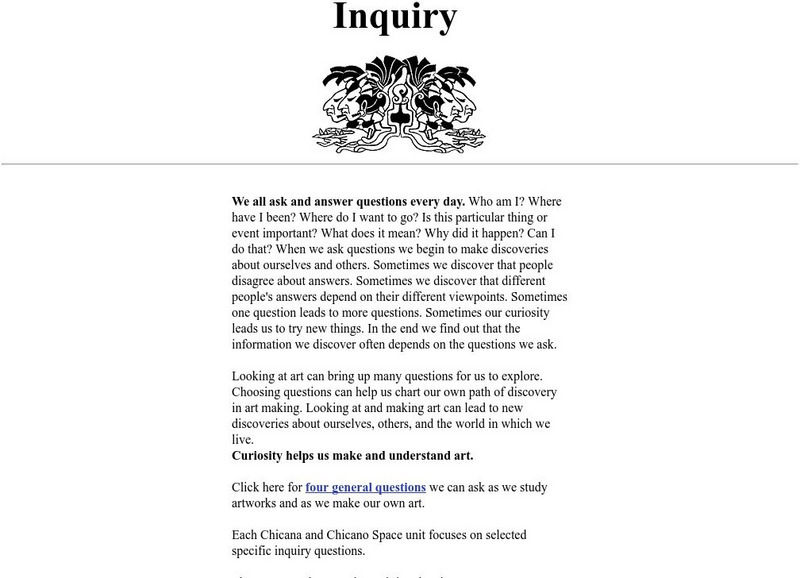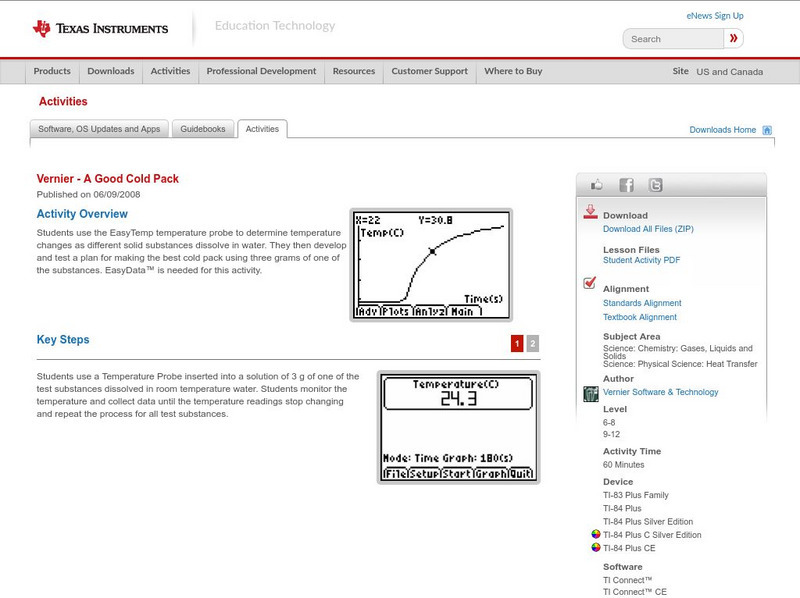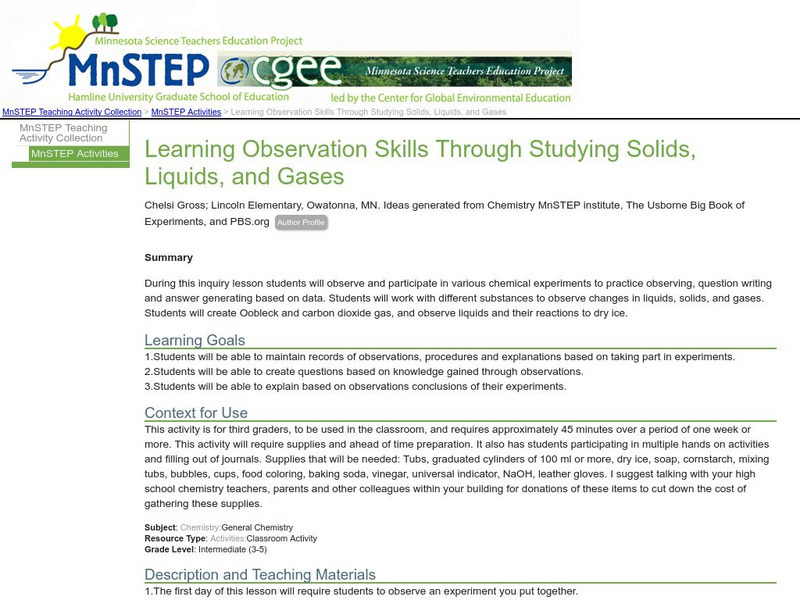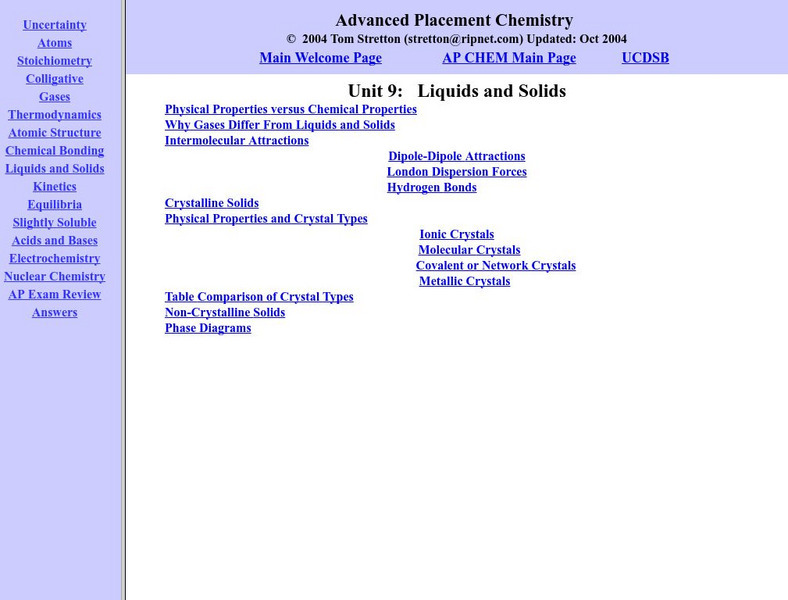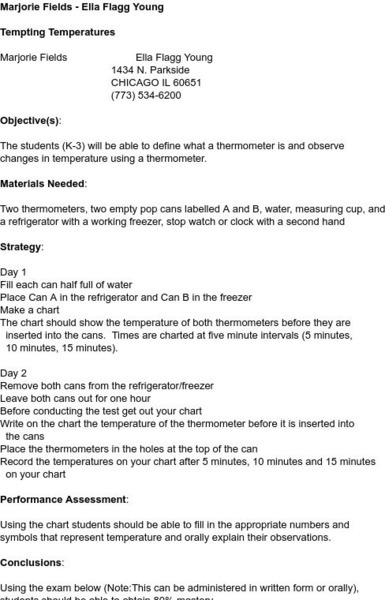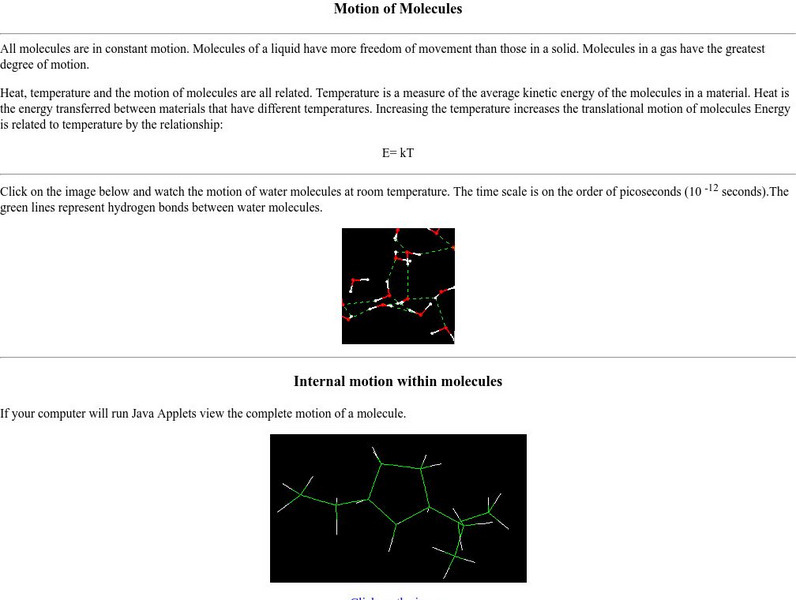Center of Science and Industry
Cosi Columbus: Can You Stand the Pressure
Science experiment that demonstrates the four states or phases of matter: solid, liquid, gas, and plasma. Includes full list of materials, procedures, and scientific explanation of how you change water from a liquid state to a gaseous...
PBS
Pbs Learning Media: Discovering Air
Our understanding about the air we breathe has changed dramatically through time. This illustrated timeline from the NOVA Web site tracks the changing thought on air and the creation of the Periodic Table of the Elements.
New York University
New York University: What Is Matter?
At this resource discover the difference between solids, liquids, and gases. Practice what you just learned with included review questions.
Arizona State University
Asu: Chicana and Chicano Space
Provided by Arizona State University, this website is a comprehensive thematic, inquiry-based art education resource. Includes two interdisciplinary units of lessons.
Science Education Resource Center at Carleton College
Serc: Is All Ice Created Equal? A Density Lab
A lab experiment that shows students that different molecules melt in different ways. This lab also allows students to practice calculating and finding density, mass, and volume. Lesson plan includes lab handout for students.
SMART Technologies
Smart: Physical and Chemical Properties
Students will learn the difference between physical and chemical properties of matter.
Science and Mathematics Initiative for Learning Enhancement (SMILE)
Smile: Somethin' Sweet
This site provides a lesson plan using candy making to demonstrate physical and chemical changes in matter. Includes directions to make caramel and rock candy.
Purdue University
Purdue Univ: Gases, Liquids, and Solids
This site has a brief description of the differences in particles in a gas, liquid, and solid. Animated microscopic pictures demonstrate the molecular movement in each state. Information is then summarized in an easy-to-read chart.
Other
Rooted and Growing: Kindergarten Science Unit: Objects and Materials [Pdf]
A collection of science lessons where young scholars explore the characteristics of different materials and everyday objects and create their own objects and art. They study the properties of the materials that make them strong,...
Arizona State University
Chicana and Chicano Space: Inquiry
Provided by Arizona State University, this website is a comprehensive thematic, inquiry-based art education resource. Includes two interdisciplinary units of lessons.
Science Education Resource Center at Carleton College
Serc: Polymers & Plastics: Classification & Models
Students will use their prior knowledge about changes of matter including physical and chemical changes to examine and categorize various types of plastics (polymers). They will identify how their chemical properties allow them to have...
Other
Howto smile.org: From Gas to Liquid to Solid
Allow your students to explore states of matter as they learn what causes frost to form on the outside of a cold container. Students will observe how liquid water can change to ice or water vapor in this lab. Lesson includes background...
Utah Education Network
Uen: Adding Heat
Observe the changes in the states of matter and volume when a balloon-covered flask with water in it is heated.
ArtsNow
Arts Now Learning: Be One With the Water [Pdf]
Fourth graders will explore states of matter and the water cycle by bringing water to life with their bodies. By enacting the changes that water molecules experience, 4th graders will learn scientific information kinesthetically.
Texas Instruments
Texas Instruments: A Good Cold Pack
Students use the EasyTemp temperature probe to determine temperature changes as different solid substances dissolve in water. They then develop and test a plan for making the best cold pack using three grams of one of the substances....
Science Education Resource Center at Carleton College
Serc: Learning Observation Skills Through Studying Solids, Liquids, and Gases
During this lesson, learners will practice observing, question writing, and answer generating based on taking part in experiments. Students will work with different substances to observe changes in liquids, solids, and gases.
Channel 4 Learning
4 L: Science Essentials: Material World
Learn about topics related to the material world. Each topic includes facts, a glossary, an interactive quiz, printable worksheets, an image bank, and web links.
CK-12 Foundation
Ck 12: Chemistry for High School
This digital textbook covers core chemistry concepts and includes interactive features, real-world examples, and videos.
Upper Canada District School Board
Tom Stretton's Advanced Placement Chemistry: Liquids and Solids
Take on this self-guided advanced level e-text, and learn about the chemical and physical structure of liquids and solids.
Ducksters
Ducksters: Kids Science: Melting and Boiling
Kid's learn about the science of melting and boiling. How matter changes state from solids to liquids to gases.
Science and Mathematics Initiative for Learning Enhancement (SMILE)
Smile: Tempting Temperatures
In this lesson plan students learn how to use a thermometer and compare changes in temperature using water in the fridge and water in the freezer. Helps students create charts to analyze data.
Alabama Learning Exchange
Alex: Save a Buck Challenge
Our pipes leak, air drafts push through our windows and walls, light bulbs create more heat than light, and every appliance we have stays plugged in all day long. Of course its our parents who pay the bills, so it doesn't matter. This is...
New York University
Nyu: Math Mol: Motion of Molecules
Examine the link between molecular motion and energy. Observe the movement of a molecule at room temperature. Learn about the different types of molecular motion.

